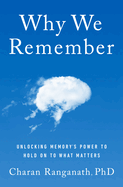
Why We Remember, the debut from Charan Ranganath (professor of psychology at the University of California, Davis), takes readers through an entertaining and thoughtful overview of the nature of memory and the advances and assumptions made about it throughout the course of recent history. Memory shapes perceptions of reality, Ranganath writes, but it doesn't exist as objective truth. And it can be manipulated in predictable and disconcerting ways. "Memories... are neither false nor true--they are constructed in the moment, reflecting both fragments of what actually transpired in the past and the biases, motivations, and cues that we have around us in the present."
He outlines which areas of the brain, such as the hippocampus and the prefrontal cortex, contribute to memory retention and construction, while explaining the distinction between episodic memory and semantic memory and the brain's schema for efficient memory-making.
Ranganath cites relevant examples from his personal life and popular culture, as well as the greater history of medical science and neuroscience; this makes the information feel intimate and tailored. Most importantly, though, he demonstrates the absolute centrality of memory in constituting a sense of self and one's place in the world when entering different life stages. He also presents lessons to be gleaned about the way in which people build knowledge, all of which draws upon recall and repurposing information. Why We Remember is a fascinating read for anyone interested in the mechanics and mystery of memory. --Elizabeth DeNoma, executive editor, DeNoma Literary Services, Seattle, Wash.

